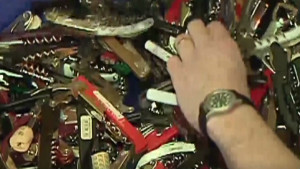Washington (CNN) -- Groups representing Federal Air Marshals and flight attendants -- outraged over the Transportation Security Administration's decision to allow small pocketknives back into aircraft cabins -- say they will ask the TSA to reconsider the policy.
Both groups say they learned about the policy change Tuesday, and charged that the TSA is forgetting about the terrorist attacks that led to the formation of the agency.
"It's as if we didn't learn anything from 9/11," said George Randall Taylor, head of the air marshal unit of the Federal Law Enforcement Officers Association (FLEOA). "Flight attendants are going to be sitting ducks."
 TSA to allow small knives on planes
TSA to allow small knives on planes On Tuesday, TSA Administrator John Pistole announced that small pocketknives and an array of sporting equipment -- which were banned from aircraft cabins in the wake of the 9/11 terrorist attacks -- will be allowed in U.S. planes beginning April 25.
Former TSA chief backs 'knife' decision; suggests axes and machetes, too
Pocketknives will be allowed if the blade is no longer than 2.36 inches (6 centimeters), which is shorter than the 4-inch blades that were allowed at the time of the 2001 attacks. And they must adhere to other rules: the blade can be no more than 1/2 inch at its widest point, it cannot have a locking or fixed blade and cannot have a molded grip. Box cutters and razor blades are still not allowed inside the passenger cabin.
The TSA also will allow travelers to bring billiard cues, ski poles, hockey and lacrosse sticks and a maximum of two golf clubs into aircraft cabins as carry-on baggage. It will allow novelty and toy bats if they measure less than 24 inches and plastic bats if they weigh less than 24 ounces.
Some experts say security improvements since the attacks -- most notably reinforced cockpit doors, better intelligence and motivated passengers -- have made the strict prohibition of small pen-knives unnecessary.
But Taylor said he is "appalled" by the decision, and said air marshals are voicing their opposition to him. "I've received probably over a hundred (calls from air marshals). They're very upset."
FLEOA President Jon Adler said the dangers extend beyond air marshals. "Pistole's decision is putting my guys at greater risk," Adler said. "It's not just the (Federal Air Marshal Service), it's all of my guys," he said, noting that law enforcement officers are allowed to carry weapons during commercial flights.
A union representing 90,000 flight attendants called the measure "a poor and short-sighted decision by the TSA."
"Continued prohibition of these items is an integral layer in making our aviation system secure and must remain in place," the Coalition of Flight Attendant Unions said in a statement.
Pistole said the TSA sought to distinguish small pocketknives, such as those equipped with corkscrews, from sturdier knives used primarily as weapons. Screeners seize on average 47 of the smaller knives every day from Los Angeles International Airport alone, he said Tuesday.
The new rule will allow screeners to focus on finding explosive device components and other things that can be "catastrophic" to a plane, speed trips through security checkpoints and "address the hassle factor," Pistole said.
Pistole said his agency consulted with its federal air marshals and other experts before making the change, and that led to the continued prohibition of the sturdier knifes with short blades.
"Experts in martial arts and close-quarters combat talked passionately about some of these smaller (knives), even though they're smaller than 6 centimeters. Some of these knives are primarily weapons and do not serve the similar purpose as what you would call a small pocketknife. Some are for hunters, for skinning; some are simply for weapons. And so those will still remain on the prohibited items list," Pistole said.
Box cutters are prohibited regardless of blade length, he said.
"I wish (the new rule) could be as clean as possible," Pistole said. But "there's just too much emotion associated with particularly the box cutters, so those will not be allowed."
Although it was widely reported that the 9/11 hijackers used box cutters in their attack, the weapons were not recovered, and investigators believe other types of knives were used.
"Our best working hypothesis is that a number of the hijackers were carrying -- permissible under the regulations in place at the time -- permissible utility knives or pocket knives," a commission staff member said at a January 2004 hearing of the 9/11 Commission.
A Leatherman knife was displayed during the hearing. The commission said its investigation found that "at least two knives like this were actually purchased by the hijackers and have not been found in the belongings the hijackers left behind."
Immediately after the attacks, the TSA prohibited a wide range of items from aircraft cabins. But it has gradually been reintroducing some banned items such as cigarette lighters and matches. On occasion the TSA has expanded the list, as it did after a liquid bomb scare in August 2006 when it prohibited bringing large containers of liquids and gels on board aircraft.
{ 0 comments... read them below or add one }
Post a Comment